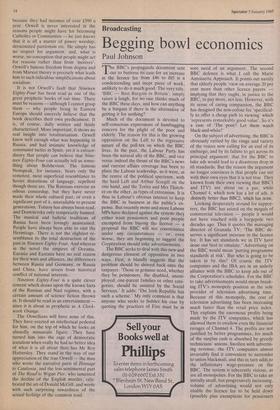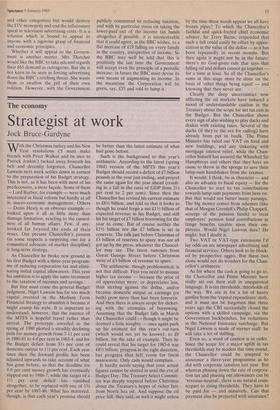Broadcasting
Begging bowl economics
Paul Johnson
The BBC's propaganda document sent out to buttress its case for an increase in the licence fee from £46 to £65 is a condescending and inept piece of work, unlikely to do it much good. The very title, 'BBC — Best Bargain in Britain', simply raises a laugh, for no one thinks much of the BBC these days, and how can anything be a bargain if there is the alternative of getting it for nothing?
Much of the document is devoted to self-conscious expressions of humbugging concern for the plight of the poor and elderly. The reason for this is the growing opposition on the Left to the regressive nature of the poll-tax on which the BBC lives. In the past, the Labour Party has been the natural ally of the BBC, and vice versa: indeed the thrust of the BBC's news and current affairs coverage has been to place the Labour leadership, as it were, at the centre of the political spectrum, with the hard Left and Arthur Scargill on the one hand, and the Tories and Mrs Thatch- er on the other, as types of extremism. It is thus in Labour's obvious interest to keep the BBC in business at the public's ex- pense. But recently more and more Labour MPs have declared against the system: they either want pensioners and poor people exempted from buying the licence — a proposal the BBC will not countenance under any circumstances — or, even worse, they are beginning to suggest the Corporation should take advertisements.
The BBC seeks to deal with this new and dangerous element of opposition in two ways. First, it blandly suggests that the problem should be shoved back onto the taxpayer: 'Those in genuine need, whether they be pensioners, the disabled, unem- ployed, one-parent families or other cate- gories, should be assisted by the Social Services.' It adds: 'The Irish Republic has such a scheme.' My only comment is that anyone who seeks to bolster his case by quoting the practices of Eire must be in sore need of an argument. The second BBC defence is what I call the Marie Antoinette Approach. It points out nastily that elderly people 'view on average 20 per cent more than other licence payers' — implying that they ought, in justice to the BBC, to pay more, not less. However, with its sense of caring compassion, the BBC has designed the non-colour fee 'specifical- ly to offer a cheap path to viewing' which 'represents remarkably good value'. So it's a case of 'The poor? Let them watch black-and-white!'
On the subject of advertising, the BBC is obviously rattled by the range and variety of the voices now calling for an end of its embargo, and by its failure to get across its principal argument: that for the BBC to take ads would lead to a disastrous drop in it standards. But the reason the argument no longer convinces is that people can see with their own eyes that it is not true. They known from their own viewing that BBC1 and ITV1 are about on a par, while Channel 4, which now has a lot of ads, is distinctly better than BBC2, which has none.
Looking desperately around for suppor- ters, the BBC has seized on the moguls of commercial television — people it would not have touched with a bargepole two decades ago. Thus it quotes the managing director of Granada TV: 'The BBC de- serves a significant increase in the licence fee. It has set standards we in ITV have done our best to emulate.' Advertising on the BBC would mean 'putting programme standards at risk'. But who is going to be taken in by this? Of course the ITV companies and the IBA are in an unholy alliance with the BBC to keep ads out of the Corporation's schedules. For the BBC to take advertisements would mean break- ing ITV's monopoly position as the sole provider of television advertising time. Because of this monopoly, the cost of television advertising has been increasing much faster than the retail price index. This explains the enormous profits being made by the ITV companies, which has allowed them to swallow even the financial ravages of Channel 4. The profits are not justified by better programmes, for much of the surplus cash is absorbed by greedy technicians' unions. Swollen with advertis- ing revenue, the ITV, companies almost invariably find it convenient to surrender to union blackmail, and this in turn adds to the inflationary wage-pressure on the BBC. The system is inherently vicious, as are all monopolies. For the BBC to take an initially small, but progressively increasing, volume of advertising would not only enable the licence fee to be held down (possibly plus exemptions for pensioners and other categories) but would destroy the ITV monopoly and end the inflationary spiral in television advertising costs. It is a solution which is bound to appeal to anyone with a rigorous grasp of financial and economic principles.
Whether it will appeal to the Govern- ment is another matter. Mrs Thatcher would like the BBC to take ads and regards their £65 demand as outrageous. But she is not keen to be seen as forcing advertising down the BBC's retching throat. She wants them io swallow the pill of their own volition. However, with the Government
publicly committed to reducing taxation, and with its particular stress On taking the lower-paid out of the income tax bands altogether if possible, it is inconceivable that it could agree, as the BBC wishes, to a flat increase of £19 falling on every family in the country, irrespective of income. So the BBC may well be told that this is positively the last time the Government will accept even the principle of a periodic increase: in future the BBC must devise its own means of augmenting its income. In the meantime the Corporation will be given, say, £55 and told to lump it.







































 Previous page
Previous page